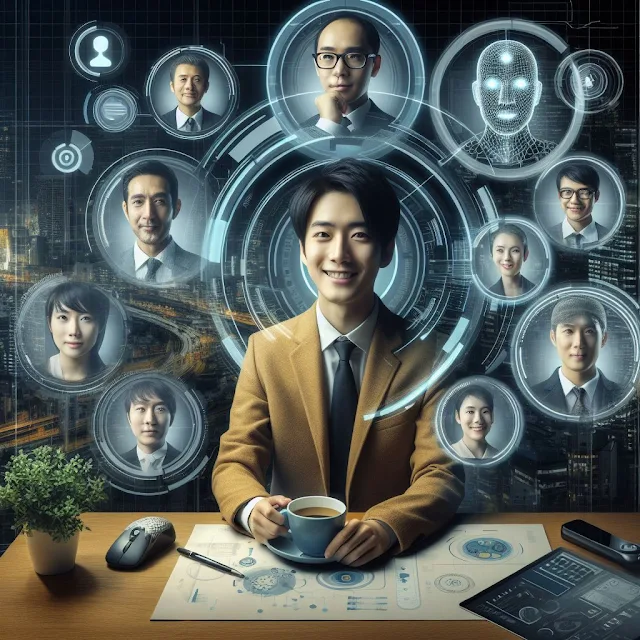AI’s Transformative Influence on Industries: Navigating the Technological Frontier
Introduction:
In the rapidly evolving landscape of modern business, Artificial Intelligence (AI) has emerged as a revolutionary force, reshaping industries across the globe. From healthcare and finance to manufacturing, education, retail, and beyond, AI's impact is profound and multifaceted. In this exploration, we delve into the transformative influence of AI on various industries, uncovering the ways in which this technology is driving innovation, enhancing efficiency, and shaping the future of business.
Healthcare:
AI is making significant strides in the healthcare sector, offering solutions to complex challenges and improving patient outcomes.
1. **Diagnosis and Treatment:**
AI algorithms analyze medical data and images, aiding in the rapid and accurate diagnosis of diseases. This not only reduces the margin of error but also expedites treatment initiation.
2. **Drug Discovery:**
AI accelerates drug discovery processes by sifting through vast datasets to identify potential compounds and predict their effectiveness. This streamlined approach holds the promise of faster and more effective drug development.
3. **Personalized Medicine:**
By analyzing individual patient data, AI enables the customization of treatment plans. This personalized approach considers genetic information, lifestyle factors, and treatment responses, leading to more effective and tailored medical interventions.
4. **Virtual Health Assistants:**
AI-powered virtual health assistants enhance patient engagement and support by providing personalized health recommendations. These virtual assistants contribute to the overall improvement of patient care.
Finance:
In the financial sector, AI is a game-changer, transforming traditional processes and opening new avenues for innovation.
1. **Algorithmic Trading:**
AI-driven algorithms analyze market trends and execute trades at speeds impossible for human traders. This enhances market liquidity and responsiveness, creating more dynamic trading environments.
2. **Fraud Detection:**
AI enhances security by detecting patterns indicative of fraudulent activities. The continuous evolution of machine learning algorithms improves the accuracy and efficiency of fraud detection systems.
3. **Customer Service:**
Chatbots powered by AI streamline customer interactions, providing instant responses and efficient query resolution. This not only improves customer satisfaction but also frees up human resources for more complex tasks.
Manufacturing:
In the realm of manufacturing, AI is revolutionizing processes, optimizing efficiency, and paving the way for the factories of the future.
1. **Predictive Maintenance:**
AI-driven predictive maintenance analyzes data from machinery sensors to forecast potential breakdowns. This proactive approach minimizes downtime, extends equipment lifespan, and enhances overall operational efficiency.
2. **Quality Control:**
AI enhances quality control by inspecting products for defects using advanced computer vision systems. This ensures that only high-quality products reach the market, reducing waste and enhancing brand reputation.
Education:
AI is reshaping education by personalizing learning experiences, automating administrative tasks, and providing innovative tools for educators.
1. **Personalized Learning:**
AI analyzes individual student learning patterns to tailor educational content and pacing. This adaptive learning approach ensures that students receive personalized instruction aligned with their unique needs.
2. **Automated Grading:**
AI automates the grading process, freeing educators from routine tasks and allowing them to focus on more interactive and personalized aspects of teaching.
Retail:
AI is transforming the retail landscape, providing insights into customer behavior, optimizing inventory management, and enhancing the overall shopping experience.
1. **Customer Insights:**
AI analyzes customer data to generate valuable insights into buying patterns and preferences. Retailers can use this information to tailor marketing strategies, ultimately providing a more personalized and engaging shopping experience.
2. **Inventory Management:**
AI optimizes inventory management by predicting demand, preventing stockouts, and reducing excess inventory. This leads to cost savings and improved overall supply chain efficiency.
Energy:
In the energy sector, AI is contributing to the optimization of energy consumption, grid management, and the integration of renewable energy sources.
1. **Grid Management:**
AI optimizes energy grids by predicting demand fluctuations, integrating renewable energy sources, and enhancing overall grid efficiency. This contributes to a more sustainable and resilient energy infrastructure.
2. **Energy Consumption Optimization:**
AI analyzes data to optimize energy consumption in buildings and industrial processes. Smart systems adjust usage based on real-time demand, reducing energy waste and costs.
Challenges and Considerations:
While AI brings about numerous benefits, it also presents challenges and considerations that industries must navigate.
1. **Ethical Considerations:**
The ethical use of AI, including issues related to bias in algorithms and responsible data management, is a crucial consideration to ensure fair and unbiased outcomes.
2. **Workforce Impact:**
The integration of AI may lead to workforce changes. Industries must address the potential impact on employment and proactively implement reskilling programs to equip workers with the skills needed in an AI-driven landscape.
3. **Data Privacy:**
As AI relies on vast amounts of data, safeguarding privacy becomes paramount. Industries must implement robust data protection measures to ensure the responsible and secure use of sensitive information.
4. **Regulatory Compliance:**
Adhering to evolving regulations surrounding AI use is essential. Industries must stay informed about legal frameworks and ensure their AI applications comply with ethical and legal standards.
Future Trends and Possibilities:
1. **Explainable AI:**
The development of AI systems with explainable decision-making processes enhances transparency and builds trust in AI applications.
2. **AI in Creativity:**
AI is increasingly being used in creative fields such as art, music, and content creation. The collaboration between human creativity and AI innovation holds promising possibilities for the future.
3. **Interconnected AI Systems:**
The integration of AI systems across industries will become more prevalent, fostering collaboration and creating synergies.
4. **Human-AI Collaboration in Research:**
The collaboration between researchers and AI systems holds the potential to accelerate scientific discoveries.
Conclusion:
AI's impact on industries is transformative, reshaping the way we work, create, and conduct business. From enhancing efficiency and productivity to unlocking new possibilities, the influence of AI is pervasive. As industries continue to embrace and adapt to this technological revolution, it is essential to navigate the challenges thoughtfully and ethically. The future holds exciting prospects as AI continues to evolve, promising a landscape where human intelligence and artificial intelligence work in harmony to drive unprecedented advancements and improvements across diverse sectors.












.jpg)






0 Comments